|
|
|
Sort Order |
|
|
|
Items / Page
|
|
|
|
|
|
|
| Srl | Item |
| 1 |
ID:
123711
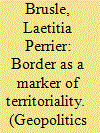

|
|
|
|
|
| Publication |
2013.
|
| Summary/Abstract |
This paper considers the film Frozen River (2008) for the purpose of considering how the US-Canadian border is dramatised within the context of two women caught up in a illicit trading of migrants via a Native American Reservation. Re-calibrating more mainstream Hollywood's fascination with the United States' southern border, Frozen River usefully focuses attention on two areas that deserve further reflection namely the materiality of borders and border crossings and biopolitics. The paper concludes with some reflections on how borders, biopolitics, dispossession and sovereignty need further theorization by political geographers and other scholars.
|
|
|
|
|
|
|
|
|
|
|
|
|
|
|
|
| 2 |
ID:
123726
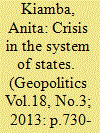

|
|
|
|
|
| Publication |
2013.
|
| Summary/Abstract |
This commentary responds to the essay Trapped in the Logic of the Modern State System? European Integration in the Wake of the Financial Crisis by Alex Murphy. The essay discusses the perseverance of the modern state system in an integrated Europe in the midst of the ongoing financial crisis. Murphy's essay raises a number of important observations and lessons for regions seeking to use the European Union model of integration. To this extent he submits that the essay is about engaging with the monetary experiences in Europe and the financial crisis experienced by the European Union since 2009. Murphy's essay provides its audience with the rationale behind the creation of the European monetary union, the structural challenges associated with the Union and the nationalist sentiments of its members amid deeper integration. The essay also provides its readers with lessons about integration and its challenges. In summary, the essay argues that the European Union has not achieved the desired level of integration because of a number of constraints, including the financial crisis which affirms that nationalist sentiments continue to exist even within a supranational institution like the European Union. Murphy's argument is that considerable attention has been specifically directed to the European Monetary Union at the expense of other integration projects. Indeed, as the financial crisis persists, its member states are becoming more fixated on their national interests. He observes that there are member states who have called on the economically weaker states like Greece to leave the Union. The essay concludes by recommending a shift in focus towards transnational networks and functional arrangements of integration rather than monetary and fiscal initiatives. The European Union provides us with an appropriate case study.
|
|
|
|
|
|
|
|
|
|
|
|
|
|
|
|
| 3 |
ID:
123719
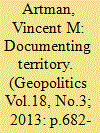

|
|
|
|
|
| Publication |
2013.
|
| Summary/Abstract |
Despite the crucial role it played in the 2008 war between Russia and Georgia, the phenomenon of passportisation has not received a great deal of scholarly attention. Much of the literature has treated the mass distribution of Russian passports to the residents of Abkhazia and South Ossetia as little more than a strategy to manufacture an excuse to go to war with Georgia. Drawing on recent scholarship on territory and territoriality, as well as with literature addressing Agamben's theories of exceptional spaces, this paper contributes to a more nuanced understanding of passportisation by analysing the territorial effects it produced. It argues that the wholesale conversion of Abkhazians and South Ossetians into Russian citizens did not merely manufacture a casus belli, it also produced exceptional spaces within the territory of the Republic of Georgia, where the norms of international law and the modern state system were effectively suspended.
|
|
|
|
|
|
|
|
|
|
|
|
|
|
|
|
| 4 |
ID:
123713
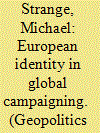

|
|
|
|
|
| Publication |
2013.
|
| Summary/Abstract |
What does it mean when activist networks describe themselves as 'European' or 'Global'? Existing studies into the geographic character of such networks have focused on the interplay between multiple 'levels'. However, there is a need for greater research on the discursive function played by geographic descriptors within the formation of activist networks. This article examines the use of multiple geographic descriptors to articulate a particular activist network - the 'Seattle to Brussels' (S2B) network - consisting of European-based groups contesting the form of multilateral trade governance embodied in the WTO. To map out how groups forged relations with one another under a 'European' identity, the article applies a discourse theoretical analysis to extensive empirical data including interviews with activists and participant observation at key events. The article has relevance to understanding both how transnational protest networks are formed and the role of multiple geographic signifiers in global politics.
|
|
|
|
|
|
|
|
|
|
|
|
|
|
|
|
| 5 |
ID:
123727
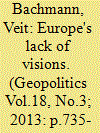

|
|
|
|
|
| Publication |
2013.
|
| Summary/Abstract |
On 1 November 2013, the European Union will celebrate its twentieth birthday. On 12 October 2012, the Nobel Committee announced the Nobel Peace Prize 2012 will be awarded to the European Union "for over six decades contributed to the advancement of peace and reconciliation, democracy and human rights in Europe".1 In the following, I will comment on Alec Murphy's paper Trapped in the Logic of the Modern State System? European Integration in the Wake of the Financial Crisis2 and argue that never before in the history of European integration, has the European 'idea' had so little inspiration and appealing visions for the future of integrating/integrated Europe to offer. This constitutes a fundamental
problem as we can currently observe a rise of nationalism and the (re-)constructions of 'us vs. them' binaries in Europe. In my argument, I side with Murphy in that both the lack of vision and such constructions are, at least partially, rooted in what he describes as a metageographical mindset based on the logic of the modern state system. Murphy traces insightfully how essential parts of the European integration processes have been trapped in a way of thinking determined by a "modernist political territorial order",3 despite the challenge European integration presents to that order (p. 3). His argument is framed around the question of why European Monetary Union (EMU) was prioritised as the preferred way to promote European integration as opposed to other possible paths of integration that seem(ed) less trapped in such modern, territorial, state-based logic.
|
|
|
|
|
|
|
|
|
|
|
|
|
|
|
|
| 6 |
ID:
123715
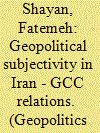

|
|
|
|
|
| Publication |
2013.
|
| Summary/Abstract |
This article enters into the debate about geopolitical subjectivity between Iran and the members of the Gulf Cooperation Council (GCC) on the three islands issue. The islands at the Western entrance to the Strait of Hormuz have so far been examined as an issue between Iran and the United Arab Emirates from historical, sovereignty and law perspectives, but this article examines the argument that the GCC has become a geopolitical subject through its support for the US policy of isolating Iran. Geopolitical subjectivity, a concept building on Pami Aalto's conceptual scheme, is the concept of goal-oriented ordering of territories and political space. We can use it to identify the GCC institution as a subject with the ability to act (and abstain from acting) and to examine Iran's response to the GCC's willingness to order the three islands. The conclusion is that the GCC became a subject in this context as soon as it felt the benefits of US support and the current rise of the soft power of Qatar. Even so, it has been unable to undermine Iran's sovereignty rights over the three islands, and the issue has strengthened, even exaggerated, states' adherence to the concept of sovereignty throughout the Persian Gulf region.
|
|
|
|
|
|
|
|
|
|
|
|
|
|
|
|
| 7 |
ID:
123698


|
|
|
|
|
| Publication |
2013.
|
| Summary/Abstract |
Model United Nations (MUN) is a simulation in which students take on the roles of ambassadors to the United Nations, engaging in debate on 'real' issues from the perspective of their assumed national identities. This paper, based on a year of ethnography and interviews of a college-level MUN team, examines the role of humour in producing particular geopolitical imaginations among those participating and also in producing the MUN assemblage itself. Key here is the circulation of affects among participants' bodies, producing an orientation among them that facilitates debate and consensus-building. This finding is seen as a corrective to past work on geopolitics and humour, which has tended to emphasise irony and satire, as well as mass-mediated humor.
|
|
|
|
|
|
|
|
|
|
|
|
|
|
|
|
| 8 |
ID:
123707
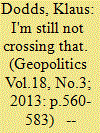

|
|
|
|
|
| Publication |
2013.
|
| Summary/Abstract |
This paper considers the film Frozen River (2008) for the purpose of considering how the US-Canadian border is dramatised within the context of two women caught up in a illicit trading of migrants via a Native American Reservation. Re-calibrating more mainstream Hollywood's fascination with the United States' southern border, Frozen River usefully focuses attention on two areas that deserve further reflection namely the materiality of borders and border crossings and biopolitics. The paper concludes with some reflections on how borders, biopolitics, dispossession and sovereignty need further theorization by political geographers and other scholars.
|
|
|
|
|
|
|
|
|
|
|
|
|
|
|
|
| 9 |
ID:
123728
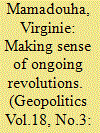

|
|
|
|
|
| Publication |
2013.
|
| Summary/Abstract |
Making sense of ongoing events is difficult for academics but a necessary exercise. The six books for review all address the events known as the Arab spring, Arab awakening, Arab revolt(s), Arab uprising(s), and Arab revolutions, that unfold after the self-immolation of Mohamed Bouazizi in Sidi Bouzid, Tunisia, on 17 December 2010. The different labels carry different connotations, be they bringing hope (spring, awakening), unarticulated mobilisations (revolt, uprising), or claims about results (revolution), while the
plural nuanced the sense of unity carried by the notion that the events in different Arab states were both linked together in a single historic moment and separated from other uprisings around the world. This separation is generally nuanced again by comparing the events to previous waves of uprisings, including the 2009 green movement in Iran, the 2005 Cedar revolution in Lebanon, the coloured revolutions in Serbia and former Soviet Republics in the 2000s, the 1989 movement ending communist rule in Europe, the 1974 Carnation revolution in Portugal, the 1968 students and civil rights movements, 1848, 1789 etc . . . . or the later urban movements like the Indignados and Occupy in 2011-2012.
|
|
|
|
|
|
|
|
|
|
|
|
|
|
|
|
| 10 |
ID:
123706
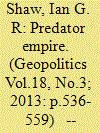

|
|
|
|
|
| Publication |
2013.
|
| Summary/Abstract |
This paper critically assesses the CIA's drone programme and proposes that the use of unmanned aerial vehicles is driving an increasingly "dronified" US national security strategy. The paper suggests that large-scale ground wars are being eclipsed by fleets of weaponised drones capable of targeted killings across the planet. Evidence for this shift is found in key security documents that mobilise an amorphous conflict against vaguely defined al-Qa'ida "affiliates". This process is legitimised through the White House's presentation of drone warfare as a bureaucratic conflict managed by a "disposition matrix". These official narratives are challenged by the voices of people living in the tribal areas of Pakistan. What I term the Predator Empire names the biopolitical power that digitises, catalogues, and eliminates threatening "patterns of life" across a widening battlespace. This permanent war is enabled by a topological spatial power that folds the distant environments of the affiliate into the surveillance machinery of the Homeland.
|
|
|
|
|
|
|
|
|
|
|
|
|
|
|
|
| 11 |
ID:
123701
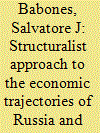

|
|
|
|
|
| Publication |
2013.
|
| Summary/Abstract |
I introduce geographical specificity to world-systems concepts of core and periphery to develop a structuralist approach on semiperipheral development in the world-economy. I apply this approach to the historical trajectory of economic growth in Russia and east-central Europe since 1900. I find circumstantial support for Wallerstein's classic assertion that mercantilist semi-withdrawal is a potentially effective development strategy for semiperipheral countries and show that Russia raised its economic output above historical trend levels during the Soviet period. In contrast, east-central Europe fell short of historical trends during the Soviet period, suggesting that Russia's gains may have been made at the expense of its satellite empire. With the end of communism, both Russia and the countries of east-central Europe quickly returned to their long-term historical output levels relative to the core countries of western Europe.
|
|
|
|
|
|
|
|
|
|
|
|
|
|
|
|
| 12 |
ID:
123725


|
|
|
|
|
| Publication |
2013.
|
| Summary/Abstract |
In February 2012 the European Commission released a video that was intended to promote the idea of European union among younger people. It shows a white woman, dressed in a golden jumpsuit, that is threatened by three men preparing to fight her. First a man, ostensibly from East Asia, jumps down in front of her performing Kung Fu. Then a practitioner of Kalaripayattu, a southern Indian martial art, levitates towards her brandishing a sabre and finally a black man cartwheels in, menacing the woman with Capoeira moves. The woman stays calm, splits into twelve versions of herself to surround the assailants, who then vanish as the twelve women turn into the twelve stars of the EU flag, accompanied by the message "The more we are, the stronger we are". The video, an attempt at viral communication, was retracted a few days after it was released - for obvious reasons. Propagating racialised threats to Europe, it is a thinly veiled attempt at promoting European unity through stoking geopolitical fears of China, India and Brazil, making individuals stand in for whole states. Its message is in tune with what Alexander Murphy diagnoses in his paper: a view of the EU as a supra-state, which is in competition with other states, and the drawing of clear boundaries of who belongs there and who does not.
|
|
|
|
|
|
|
|
|
|
|
|
|
|
|
|
| 13 |
ID:
123324
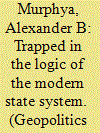

|
|
|
|
|
| Publication |
2013.
|
| Summary/Abstract |
In the wake of the Single European Act of the mid-1980s and a series of follow-on initiatives aimed at fostering greater integration in Europe, a number of commentators began describing Europe as a truly novel political-territorial arrangement. By the middle of the 1990s, however, the adoption of a common currency came to dominate the European integration agenda. The embrace of monetary union reflected a view of European integration that was firmly embedded in the logic of the modern territorial state system. That logic led many commentators to view the success or failure of integration in terms of the degree to which powers were being transferred from state governmental and economic institutions to the central decision-making bodies of the European Union. Such an approach cast the EU as a super-state rather than as a new type of political-institutional entity. As a result, the integration project was less subversive of the state system than it might otherwise have been - bolstering the view of the European Union as a distant bureaucracy not adequately attuned to the needs of everyday Europeans and fueling nationalist sentiments: a social force with deep roots in the modernist territorial order. Moving the European integration process forward will likely require embracing conceptions of progress that are less tethered to modernist territorial ideas and assumptions.
|
|
|
|
|
|
|
|
|
|
|
|
|
|
|
|
| 14 |
ID:
123724


|
|
|
|
|
| Publication |
2013.
|
| Summary/Abstract |
In the wake of the Single European Act of the mid-1980s and a series of follow-on initiatives aimed at fostering greater integration in Europe, a number of commentators began describing Europe as a truly novel political-territorial arrangement. By the middle of the 1990s, however, the adoption of a common currency came to dominate the European integration agenda. The embrace of monetary union reflected a view of European integration that was firmly embedded in the logic of the modern territorial state system. That logic led many commentators to view the success or failure of integration in terms of the degree to which powers were being transferred from state governmental and economic institutions to the central decision-making bodies of the European Union. Such an approach cast the EU as a super-state rather than as a new type of political-institutional entity. As a result, the integration project was less subversive of the state system than it might otherwise have been - bolstering the view of the European Union as a distant bureaucracy not adequately attuned to the needs of everyday Europeans and fueling nationalist sentiments: a social force with deep roots in the modernist territorial order. Moving the European integration process forward will likely require embracing conceptions of progress that are less tethered to modernist territorial ideas and assumptions.
|
|
|
|
|
|
|
|
|
|
|
|
|
|
|
|
| 15 |
ID:
123320
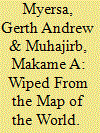

|
|
|
|
|
| Publication |
2013.
|
| Summary/Abstract |
This essay uses the case of Zanzibar in its complicated relationship with the United Republic of Tanzania (of which it is a part) as a lens on debates in political geography on empirical and conceptual approaches to critical geopolitics. We test the veracity of a multi-faceted critical geopolitics in the contemporary public contestation of Zanzibar's place in the United Republic from 2008-2012. We analyze Tanzanian media, the speech acts of Tanzanian leaders, and the key events and processes related to what is termed the 'Zanzibar problem' during the selected years, to make two points about a critical geopolitics approach: to strengthen critical geopolitics by broadening the analysis of language to engage political acts and languages beyond the Global North; and taking 'subaltern geopolitics' more seriously via engagement with critical geopolitical voices on discourses, events and processes from the Global South.
|
|
|
|
|
|
|
|
|
|
|
|
|
|
|
|
| 16 |
ID:
123718
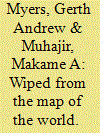

|
|
|
|
|
| Publication |
2013.
|
| Summary/Abstract |
This essay uses the case of Zanzibar in its complicated relationship with the United Republic of Tanzania (of which it is a part) as a lens on debates in political geography on empirical and conceptual approaches to critical geopolitics. We test the veracity of a multi-faceted critical geopolitics in the contemporary public contestation of Zanzibar's place in the United Republic from 2008-2012. We analyze Tanzanian media, the speech acts of Tanzanian leaders, and the key events and processes related to what is termed the 'Zanzibar problem' during the selected years, to make two points about a critical geopolitics approach: to strengthen critical geopolitics by broadening the analysis of language to engage political acts and languages beyond the Global North; and taking 'subaltern geopolitics' more seriously via engagement with critical geopolitical voices on discourses, events and processes from the Global South.
|
|
|
|
|
|
|
|
|
|
|
|
|
|
|
|
|
|
|
|
|